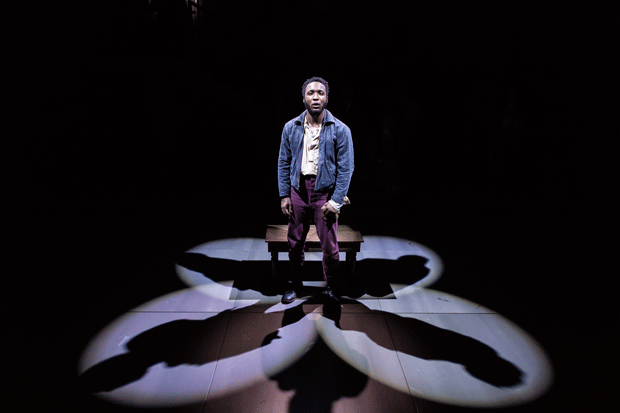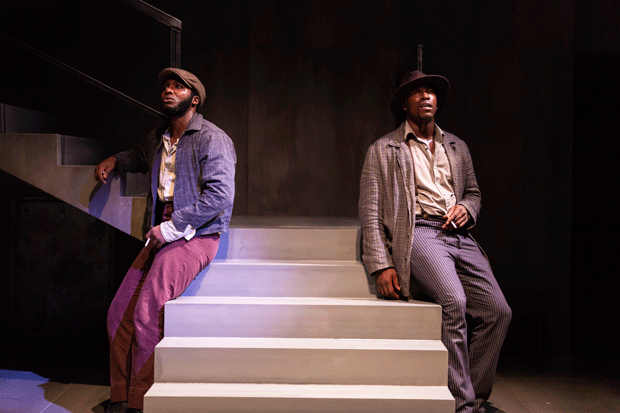Fighting the Power in Native Son and Measure for Measure
The Acting Company pairs Richard Wright and William Shakespeare to wake us up to injustice.

(© T. Charles Erickson)
Few of Shakespeare's lesser-known plays have gotten more attention in recent years than Measure for Measure, which tells the story of a randy, opportunistic defender of the law who promises to grant a young woman's request in exchange for sex. (Coriolanus, about an arrogant, two-faced politician who wins over, then betrays his supporters, comes in a close second.) There's no arguing that Measure speaks directly to the #MeToo movement, and with the Brett Kavanaugh confirmation hearings almost a year in the past, it's no surprise that the Acting Company has chosen to keep the memory fresh and stage its own Measure, which it has trimmed to a sometimes insightful, mostly workaday 95 minutes.
What's more insightful is the company's decision to pair Shakespeare's play with Nambi E. Kelley's Native Son, a smart, at-times-confusing adaptation of Richard Wright's novel of the same name, and run the two in rep. When the plays join hands, they create an experience greater than that of either play performed alone. Yet despite some fine performances and a few directorial choices that take aim at racists and abusers in the halls of privilege, neither production really wows.
Wright's psychological novel doesn't lend itself easily to dramatic adaptation because much of the "action" takes place in the mind of its hero, Bigger Thomas, as he contemplates the perils of being a black man in 1930s America. Several films have attempted to bring Bigger's story to the screen, including a clumsily directed, ludicrously performed 1951 film cowritten by and starring Wright himself. Suzan-Lori Parks's recent updated version for HBO fares somewhat better but fails to translate the novel's Great Depression-era America credibly to our time. Kelley's adaptation captures its hero's interior life better than those attempts.
Native Son tells the story of Bigger Thomas (eloquently performed by Galen Ryan Kane), a young black man who does not feel in control of his life. A lucky break working as a chauffeur for a wealthy white family goes wrong when Mary (Rebekah Brockman), the daughter of her employer, gets drunk and forces him to carry her to her bedroom late one night. Fearing discovery by Mary's blind mother (Laura Gragtmans) and knowing what will happen to a black man caught with a white woman in her bedroom, he accidentally smothers Mary, then tries to cover up the crime by burning her body in a furnace, leading to his flight from the law and his family. Ultimately, Bigger sees his reprehensible actions as the only means to escape white tyranny in a society where a black man's body is not his own.

(© T. Charles Erickson)
Kelley's adaptation manages to get most of the novel's major episodes into a brisk 90 minutes, diving right in with the murder, and then flashing backward and forward in time as Bigger recalls the surrounding events. Unique to this play, a character called Black Rat (Jason Bowen wearing a shadowy fedora and speaking in a menacing baritone) is the voice inside Bigger's head who gives him survivalist advice and warns him about phony, patronizing allies like Mary, her communist boyfriend Jan (Anthony Bowden), and her mother — "well-meaning" whites who see people of color either as charity cases or as sources of anthropological adventure.
Director Seret Scott does a decent job blending scenes seamlessly as they pass through Bigger's mind (those unfamiliar with the novel may have some trouble following the nonlinear plot). Not so effective is the noirish atmosphere that she creates for this already lurid tale. The body-burning scene, for example, seems like something out of a penny dreadful, eliciting chuckles when a limp-limbed mannequin is stuffed into a red glow in the back wall. Neil Patel's bleak set, with gray stairs leading to a dimly lit upper level, adds to the sensationalism, made bleaker by lighting designer Alan C. Edwards's heavy shadows. Bigger's story is bigger than this.
The same set is used for Measure for Measure, directed with less harrowing staging by Janet Zarish. The Acting Company's modern-day take on Measure for Measure makes its agenda obvious from the beginning with speakers blaring headlines about hate crimes, poverty, global warming, and gun violence (sound design by Fabian Obispo). What you're going to see (the play seems to shout) is going to be relevant, damn it.

(© T. Charles Erickson)
And it is. Measure deals with the attempted seduction of a young nun-in-training by a stern, conservative-minded head of a very conservative state. A young man named Claudio (Lorenzo Jackson) has been accused of fornication and has been sentenced to death by the strictly law-abiding Angelo (Sam Lilja). When Claudio's sister, Isabella (Brockman), begs for her brother's life, Angelo says he will stay the execution if she sleeps with him. A series of events, including some unlikely mistaken identities, ultimately expose Angelo's abuse of power.
The most riveting scene in this production takes place near the end with Angelo facing a court and answering questions about his alleged attempts to obtain sex from an unwilling party by exercising his power over her. "This is just like Kavanaugh," whispered a theatergoer at the performance I attended. Again, it's no wonder Measure resonates more than ever these days.
Despite the fact that these productions offer nothing groundbreaking in the way of theatricality, the Acting Company's pairing of Measure for Measure and Native Son does call attention to cavalier attitudes toward black and female bodies and to the white patriarchy that seeks to control them. "My body is their body," says Bigger near the end of his play, speaking of white America as he stands face to face with a destiny he didn't choose. It was no accident that in the novel, Wright began Bigger's story with the loud ring of an alarm clock. If you're still sleeping, these plays remind us, you need to wake up.







